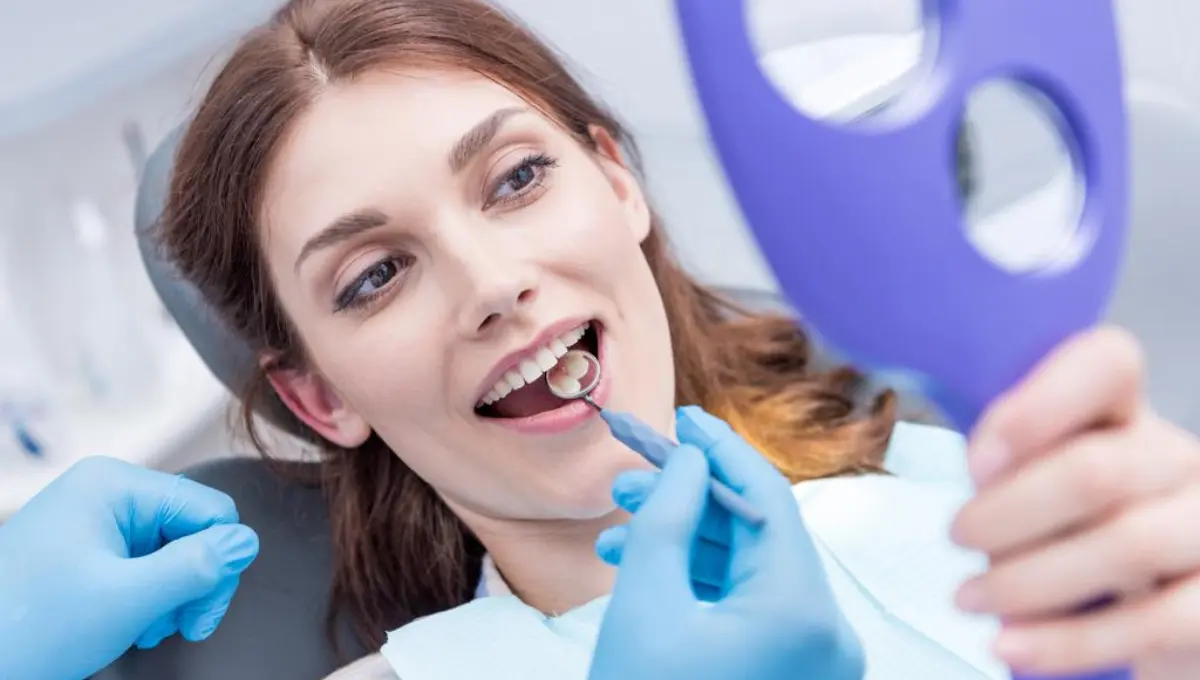Pregnancy is a time of significant physical changes, and this includes changes in oral health. As an expectant mother, it’s crucial to prioritize your dental care for the well-being of both you and your baby. Maintaining optimal oral health during pregnancy is essential to prevent potential complications and ensure a healthy pregnancy journey.
During pregnancy, hormonal changes in your body can make you more susceptible to dental problems like gingivitis and cavities. These changes, combined with challenges in maintaining proper dental hygiene due to gum tenderness, highlight the importance of regular dental care and hygiene practices.
The good news is that dental care during pregnancy is safe and highly recommended. Dental checkups and cleanings are essential for preventing and addressing any oral health issues that may arise. Dental X-rays can also be performed with proper precautions to ensure the well-being of both you and your baby.
Remember to communicate with your dental and prenatal care providers about any concerns or oral health issues you may have. They play a crucial role in educating and counseling you on the importance of oral health care and provide the necessary resources to support you throughout your pregnancy.
Key Takeaways:
- Oral health is an integral part of prenatal care during pregnancy.
- Pregnant women are more susceptible to dental problems due to hormonal changes.
- Maintaining good dental hygiene practices is crucial to prevent oral health issues.
- Dental checkups and cleanings are safe and recommended during pregnancy.
- Effective communication with dental and prenatal care providers is essential for comprehensive care.
Related: 20 Tips for a Healthy Pregnancy Oral Care
Pregnancy and Dental Health: How Pregnancy Affects Your Dental Health
Pregnancy brings about hormonal changes in the body that can impact dental health. Increased levels of hormones, such as progesterone and estrogen, can make pregnant women more susceptible to oral health problems, including cavities and gingivitis. These hormonal changes can lead to an increased blood flow to the gums, causing them to become more sensitive and prone to inflammation.
Furthermore, changes in eating habits during pregnancy, such as increased consumption of sugary snacks and cravings for acidic foods, can also contribute to dental issues. Combined with challenges in brushing and flossing due to gum tenderness and morning sickness, pregnant women may find it more difficult to maintain good oral hygiene practices.
To ensure optimal dental health during pregnancy, it is important for pregnant women to take extra care of their oral hygiene. Brushing teeth twice a day with fluoride toothpaste, flossing daily, and using an antimicrobial mouthwash can help remove plaque and bacteria, reducing the risk of cavities and gum disease.
Dental Hygiene Tips for Pregnant Women:
- Choose a soft-bristled toothbrush to minimize gum irritation.
- Be gentle when brushing and flossing to avoid causing bleeding or discomfort.
- Consider using a toothpaste specifically designed for sensitive teeth and gums.
- Maintain a balanced diet and limit sugary snacks and beverages.
- If morning sickness makes it difficult to brush your teeth, try rinsing your mouth with water or a fluoride mouthwash.
- Stay hydrated to promote saliva production, which helps neutralize acids and wash away food particles.
| Dental Hygiene Do’s | Dental Hygiene Don’ts |
|---|---|
| Brush teeth twice a day with fluoride toothpaste. | Consume excessive amounts of sugary snacks or beverages. |
| Floss daily to remove plaque between teeth. | Neglect regular dental checkups and cleanings. |
| Use an antimicrobial mouthwash to reduce bacteria in the mouth. | Brush aggressively, as it can irritate the gums. |
| Eat a balanced diet rich in vitamins and minerals. | Smoke or use tobacco products, as they increase the risk of gum disease. |
By maintaining good dental hygiene practices and seeking professional dental care during pregnancy, pregnant women can protect their oral health and reduce the risk of oral health problems that may arise during this time.
Pregnancy and Dental Health: Dental Care and Treatment during Pregnancy
During pregnancy, maintaining good dental care is essential for both the mother’s well-being and the health of the baby. Regular dental checkups and cleanings are safe and highly recommended, as they help prevent the progression of dental issues and ensure oral health. It is important for pregnant women to inform their dentist about their pregnancy before any procedures. With proper precautions, dental X-rays can be performed to diagnose and treat dental problems, while ensuring the safety of both the mother and the baby.
If dental treatment is necessary during pregnancy, it can be safely done with the use of local anesthesia. The second trimester is considered the most ideal time for elective dental treatments, although necessary treatments can be performed at any stage of pregnancy. Dentists and prenatal care providers work together to ensure that the appropriate dental care is provided while considering the well-being of both the mother and the developing baby.
It is crucial for pregnant women to communicate openly with their dental and prenatal care providers about any concerns or oral health issues they may have. By addressing these concerns and receiving timely dental care, pregnant women can contribute to a healthy pregnancy and a healthy baby. Dental care during pregnancy not only helps maintain oral health but also minimizes the risk of adverse pregnancy outcomes often associated with untreated oral health problems.

Dental Care and Treatment during Pregnancy:
| Dental Procedure | Timing during Pregnancy |
|---|---|
| Regular checkups and cleanings | Throughout pregnancy |
| Dental X-rays | With proper precautions and protective measures |
| Dental treatments (e.g., fillings, root canals) | Any stage of pregnancy |
| Elective treatments (e.g., teeth whitening) | Second trimester or after delivery |

By following proper dental care guidelines and seeking appropriate treatment, pregnant women can ensure their oral health remains in good condition throughout pregnancy. It is important to prioritize oral health as part of overall prenatal care to promote a healthy pregnancy and the well-being of both the mother and the baby.
Related: Guide: How to Choose a Prenatal Vitamin for a Healthy Pregnancy
Conclusion
Maintaining good oral health during pregnancy is crucial for both your well-being and the health of your baby. Neglecting oral health can lead to adverse pregnancy outcomes, so it’s important to prioritize it as part of your prenatal care. By following simple oral health habits, seeking appropriate dental care, and working closely with your healthcare providers, you can contribute to a healthy pregnancy and a healthy baby.
Regular dental checkups and cleanings are safe during pregnancy and highly recommended. Don’t hesitate to inform your dentist about your pregnancy before any procedures. Dental X-rays can be done with proper precautions to protect you and your baby. If you require dental treatment, it can be done safely with the use of local anesthesia. However, elective treatments can be scheduled in the second trimester or after delivery.
Remember to practice good oral hygiene habits throughout your pregnancy. Brush your teeth at least twice a day with fluoride toothpaste and floss daily. These simple steps can help prevent dental problems and maintain your oral health. Always communicate any concerns or oral health issues to your dental and prenatal care providers so that they can provide you with the best advice and care.
Make oral health care a priority during your pregnancy. By doing so, you are not only taking care of yourself but also setting the foundation for your baby’s oral health. Your healthcare providers play a crucial role in educating and counseling you about the importance of oral health care. Together, you can ensure a healthy oral environment for you and your baby.
Frequently Asked Questions (FAQs)
What are the oral health problems that pregnant women commonly experience?
Pregnant women commonly experience gingivitis, which is an early stage of gum disease, and are more susceptible to cavities.
Why are pregnant women more prone to oral health problems?
Hormonal changes during pregnancy can make women more susceptible to dental issues, and changes in eating habits and gum tenderness can further contribute to oral health problems.
Is it safe to visit the dentist during pregnancy?
Yes, regular dental checkups and cleanings are safe and highly recommended during pregnancy. Dental X-rays can also be performed with proper precautions.
Can dental treatments be done during pregnancy?
Yes, dental treatments, including the use of local anesthesia, can be safely done during pregnancy. However, elective treatments can be scheduled for the second trimester or after delivery.
How important is it to maintain good oral hygiene during pregnancy?
It is crucial to maintain good oral hygiene during pregnancy to prevent dental problems that can lead to adverse pregnancy outcomes.
What should pregnant women do if they have oral health concerns?
Pregnant women should communicate with their dental and prenatal care providers about any concerns or oral health issues they may have.
How does oral health during pregnancy affect the health of the baby?
Oral health problems, if left untreated, can contribute to adverse pregnancy outcomes. By taking care of their oral health, pregnant women can contribute to a healthy pregnancy and a healthy baby.
Source Links
- https://www.marchofdimes.org/find-support/topics/pregnancy/dental-health-during-pregnancy
- https://www.acog.org/clinical/clinical-guidance/committee-opinion/articles/2013/08/oral-health-care-during-pregnancy-and-through-the-lifespan
- https://www.cdc.gov/oralhealth/publications/features/pregnancy-and-oral-health.html












